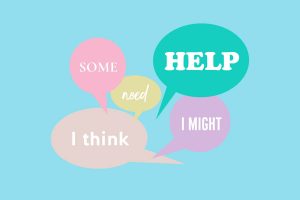Why we need to get talking about mental health

CAN YOU DEFINE YOUR PERSONAL JOURNEY OF DEALING WITH MENTAL HEALTH?
James: For me, it still has a long-lasting impact – since my childhood – but I have a whole toolkit of things to help: music, my shrink and medication, my wife, Hattie, and friends, and exercise.
TaTa: I had to be hospitalised because of my mental health 16 years ago, and again in 2008 when I stopped taking my medication. Now, I live on my own and I’m doing well. I’m proactive about taking responsibility for myself because no one else will.
Vogue: I first experienced anxiety when I was about 25. It didn’t start with anything specific, but it got worse last year with the breakdown of my marriage. It comes out of nowhere and my breathing is weird.
WHEN WAS THE FIRST TIME YOU SPOKE UP ABOUT THE STRUGGLES YOU FACED?
James: I started talking to friends about it when I was 19, after a stay in a psychiatric hospital. It wasn’t hard to do, although there remains a certain amount of shame for me still attached to the sexual abuse stuff that I don’t find comfortable.
TaTa: It was in 2003, when I was in group therapy. It was scary but liberating – I’d been brought up not to discuss personal issues. I went from victim to survivor, and it helped me move on and to write my story of abuse at the hands of my family.
Vogue: The first time was in an interview with a journalist. It’s not something I’ve hidden – it just never came up in conversation. I now see a counsellor – it’s a great way to put everything on the table with someone who’s not going to judge you, but can help you sort through everything yourself.
HOW DOES THE SYSTEM NEED TO CHANGE TO END DISCRIMINATION AND IMPROVE MENTAL HEALTH CARE?
James: That’s a big question. There’s goodwill within the NHS, but it’s an over-stretched resource – it can take 10 months to get assessed. And people need to be more accepting. Ring in sick to work with intense anxiety and you’ll get fired, but say you’ve got a slipped disc and they’d be no repercussions. It’s good that more people are speaking out about how it affects them, but the language in the media has to change.
TaTa: I think the mental health care service has to be more aware of the subtle cultural issues that can be more prevalent in BAME (Black, Asian and Minority Ethnic) communities. In my opinion, the present system is designed to perpetuate discrimination and ensure that vast swathes of people from BAME backgrounds do not get the help they need.
Vogue: Mental health services need more government funding – the waiting list to see an NHS counsellor is shamefully long.
WHAT WOULD YOU TELL SOMEONE TO HELP THEM BETTER SUPPORT A FRIEND STRUGGLING WITH MENTAL HEALTH?
James: Listen, and really listen, not while you’re on Twitter or watching TV. Accept that suicide is a valid choice that makes sense to them. Tell them that you understand, even if you don’t.
TaTa: Give them plenty of space and maintain boundaries. Do not get too involved, do not take their problems as your own and refrain from giving advice or telling them what to do!
Vogue: It can be hard to understand if you’ve never gone through it yourself, but just be a friend to them. It’s OK not to have all the answers – just try and be there and listen. Little things really do help these big issues.
WHERE DO YOU THINK THE STIGMA SURROUNDING MENTAL HEALTH COMES FROM?
James: Misunderstanding and fear. Sensational headlines – ‘schizo mad person stabbed man’ – give the wrong impression of mental illness. I’ve yet to meet someone who would not be diagnosed with something, whether it’s mild anxiety, trouble sleeping or addiction to
social media.
TaTa: This can start in families. A ‘get on with it’ kind of attitude is detrimental and it is passed on from one generation to another.
Vogue: It’s from a lack of understanding – it’s a scary topic if you know nothing about it. Also, unlike a physical disability, symptoms are not visible – unfortunately, that’s why a lot of people suffer in silence.
HAS DEALING WITH MENTAL HEALTH TAUGHT YOU ANYTHING?
James: It’s all I’ve ever known. If I hadn’t had it, perhaps I could have won a Nobel prize – who knows? It’s given me a deeper understanding of what it is to be human and to be fallible, and that can’t be a bad thing.
TaTa: I’ve learnt the value of humour, flexibility and self-love, and the importance of silence, spending time alone, meditation and a good diet. Balance is key – as is looking within oneself.
Vogue: I’ve now come to the realisation that it’s a big problem among people of my age and that it’s nothing to be ashamed of. I’ve learned a lot about myself – for instance, I now know that I need to exercise regularly and have structure, so I’ve had to adjust the way I live my life.
WE NEED TO GET TALKING ABOUT MENTAL HEALTH BECAUSE…
James: …when the chips are down, that’s all we’ve got.
TaTa: …the global environment is changing at such a phenomenon pace which means that the landscape and structure of mental health also needs to change and keep up with its inhabitants within the world at large.
Vogue: …so many people are affected by it and talking about the issues stops the stigma.
FIVE THINGS YOU NEED TO KNOW ABOUT TALKING THERAPY

Dr Elena Touroni is a consultant psychologist in a central London NHS Trust and the clinic director for The Chelsea Psychology Clinic
Getting to the heart of your problem
Talking therapy can help you understand more precisely your thoughts, feelings and behaviour. It can also shed light into the patterns you tend to repeat when you’re in intimate relationships. When you’re suffering from tricky emotional difficulties or mental health issues, it can be difficult to think clearly, especially when you’re not feeling at your best. Talking therapy provides you with a compass to help you understand your difficulties, how they developed and how to find solutions to help you overcome them.
Recognise symptoms and fight the fear
If you often feel low or fearful, have become isolated from friends and family, find that things that previously gave you a great amount of pleasure no longer hold any enjoyment, then it might be helpful to speak to someone who can help. The rule of thumb is that if your difficulties are affecting the way you live your life and restricting your choices, then it’s the right time to make an appointment with a qualified therapist in mental health.
Talk to an expert
There are many ways of finding a therapist. You can go to your GP, search online, or ask one of the regulatory bodies for a list of accredited psychologists or psychotherapists in your area. Qualified psychologists are registered with the Health and Care Professions Council (HCPC); accredited psychotherapists are registered with the United Kingdom Council for Psychotherapy (UKCP).
When you contact a therapist, check their professional qualifications and what therapeutic approaches they are trained in. Psychologists have training in a range of therapeutic approaches, which means that they offer treatment with reliable outcomes and can adapt the type of therapy to the needs of the individual client. Have an initial meeting to help you decide if the therapist and approach are right for you.
How to get therapy
Talking therapy should be made available to everyone. Certain government initiatives such as IAPT (Increasing Access to Psychological Therapies) have made talking therapy widely available since 2006/2007.
Most GP surgeries have IAPT services attached to them that offer mainly cognitive-behavioural therapy for the treatment of anxiety, depression and other emotional difficulties.
It’s good to share
Talking about mental health issues breaks stereotypes, takes the stigma out of the subject, improves relationships, as well as helps you build support systems and develop a plan for a meaningful life. Speaking out increases compassion in ourselves and others, and hope
for a different future.












